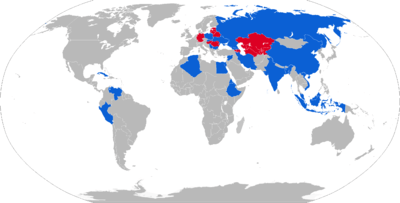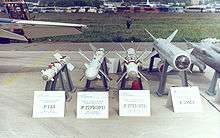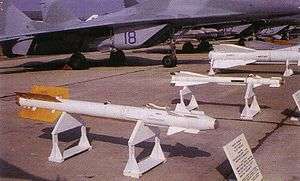R-73 (missile)
| R-73 AA-11 Archer | |
|---|---|
|
| |
| Type | short-range air-to-air missile |
| Place of origin | Soviet Union |
| Service history | |
| In service | 1984-present |
| Production history | |
| Manufacturer | Vympel NPO (former), Tbilisi Aircraft Manufacturing (current) |
| Specifications | |
| Weight | 105 kilograms (231 lb) |
| Length | 2.93 metres (9 ft 7 in) |
| Diameter | 165 millimetres (6.5 in) |
| Warhead | 7.4 kilograms (16 lb) |
|
| |
| Engine | solid-fuel rocket engine |
| Wingspan | 510 millimetres (20 in) |
Operational range |
R-73E: 20 kilometres (12 mi) |
| Speed | Mach 2.5 |
Guidance system | All-aspect infrared homing |
Launch platform | |
The Vympel R-73 (NATO reporting name AA-11 Archer) is a short-range air-to-air missile developed by Vympel NPO that entered service in 1984.[3]
Development
The R-73 was developed to replace the earlier R-60 (AA-8 'Aphid') weapon for short-range use by Soviet fighter aircraft. Work began in 1973, and the first missiles entered service in 1984.[4]
The R-73 is an infrared homing (heat-seeking) missile with a sensitive, cryogenic cooled seeker with a substantial "off-boresight" capability: the seeker can "see" targets up to 40° off the missile's centerline.[5] It can be targeted by a helmet-mounted sight (HMS) allowing pilots to designate targets by looking at them. Minimum engagement range is about 300 meters, with maximum aerodynamic range of nearly 30 km (19 mi) at altitude. The weapon is used by the MiG-29, MiG-31, Su-27, Su-34 and Su-35, and can be carried by newer versions of the MiG-21, MiG-23, Sukhoi Su-24, and Su-25 aircraft.[6] India is looking to use the missile on their HAL Tejas. It can also be carried by Russian attack helicopters, including the Mil Mi-24, Mil Mi-28, and Kamov Ka-50/52.
The R-73 is a highly maneuverable missile and mock dogfights between USAF and German Air Force MiG-29s (inherited from the former Air Forces of the National People's Army) equipped with the R-73/helmet mounted cueing have indicated that the high degree of "off-boresight" capability of the R-73 would make a significant difference in combat. The missile also has a mechanically simple but effective system for thrust-vectoring. The R-73 prompted the development of a number of western air-to-air missiles including the ASRAAM, IRIS-T, MICA IR, Python IV and the latest Sidewinder variant, the AIM-9X which entered squadron service in 2003.
From 1994, the R-73 has been upgraded in production to the R-73M standard, which entered CIS service in 1997. The R-73M has greater range and a wider seeker angle (to 60° off-boresight), as well as improved IRCCM (Infrared Counter-Counter-Measures). Further developments include the R-74 (izdeliye 740) and its export variant RVV-MD.[7]
An improved version of the R-74, the K-74M (izdeliye 750) features fully digital and re-programmable systems, and is intended for use on the MiG-35 or MiG-29K/M/M2 and Su-27SM, Su-30MK and Su-35S. A further upgrade, known as the K-74M2 (izdeliye 760), is intended for the fifth-generation Sukhoi PAK FA aircraft. This missile has reduced cross section to fit in internal weapon bays and will match the performance of the AIM-9X and the ASRAAM. A clean sheet design, the K-MD (izdeliye 300), will supersede the K-74M2 in the future.[8][9]
Operational history
On 24 February 1996, two Cessna 337s of the Brothers to the Rescue were shot down by a Cuban Air Force MiG-29UB. Each of the aircraft was downed by a R-73 missile.[10]
During the Eritrean-Ethiopian War from May 1998 to June 2000, R-73 missiles were used in combat by both Ethiopian Su-27s and Eritrean MiG-29s. It was the IR-homing R-60 and the R-73 that were used in all but two of the kills.
On 18 March 2008, a MiG-29 Fulcrum of the Russian Air Force intercepted a Georgian Elbit Hermes 450 UAV over Abkhazia. The MiG-29 destroyed the UAV with an R-73 missile.[11] The incident was one of many that led up to the 2008 Russo-Georgian conflict.
Variants
- R-73 - Standard model with ±45° off-boresight.
- R-73M - Improved model.
- R-74 (izdeliye 740) - Improved model with ±60° off-boresight.
- RVV-MD - Export model of the R-74.
- K-74M (izdeliye 750) - Improved model with ±75° off-boresight.
- K-74M2 (izdeliye 760) - Further improved variant with reduced cross-section for the PAK FA. Intended to match the AIM-9X and ASRAAM.
Operators

Current operators
 Algeria[12]
Algeria[12] Bangladesh[13]
Bangladesh[13] Bulgaria
Bulgaria China
China Cuba
Cuba Eritrea
Eritrea Ethiopia
Ethiopia Georgia Used on Su-25 km Scorpion.[14]
Georgia Used on Su-25 km Scorpion.[14] India
India Indonesia
Indonesia Iran
Iran Malaysia
Malaysia North Korea
North Korea Peru
Peru Poland
Poland Russia
Russia Serbia
Serbia Slovakia
Slovakia Syria
Syria Ukraine
Ukraine Venezuela
Venezuela Vietnam
Vietnam Egypt
Egypt
Former operators
 East Germany
East Germany Germany
Germany Hungary
Hungary Romania
Romania Soviet Union Passed to successor states.
Soviet Union Passed to successor states.
Gallery
-

R-73 in front of an R-77
-

R-73Ae, R-27R1(AeR1), R-27T1(AeT1) and Kh-59MAe at 1999 MAKS (air show).
-

Tejas PV-1 firing an R-73 missile during weapons trials in Goa
Related
Notes
- ↑ "AA-11 ARCHER R-73". Retrieved 23 December 2014.
- ↑ "Tactical Missiles Corporation JSC". Retrieved 23 December 2014.
- ↑ http://fas.org/man/dod-101/sys/missile/row/aa-11.htm
- ↑ http://fas.org/man/dod-101/sys/missile/row/aa-11.htm
- ↑ Reed Business Information Limited. "Vympel reveals previously classified air-to-air missiles". Retrieved 23 December 2014.
- ↑ http://www.uuaz.ru/production/su25ub/su25ub_wpn_e.html
- ↑ Barrie, Douglas and Pyadushkin, Maxim. "R-77, R-73 Missile Upgrades Emerge". Aviation Week. 13 August 2009
- ↑ Butowski, Piotr. Russia and CIS Observer. 17 June 2007.
- ↑ "Vympel plans to develop air-to-air missiles for Russia's PAK FA fighter". Jane's Missiles and Rockets. 19 May 2006
- ↑ http://www1.umn.edu/humanrts/cases/86-99.html
- ↑ "Russian jet shoots Georgian drone © Reuters". YouTube. Retrieved 23 December 2014.
- ↑ "Weapon". Retrieved 23 December 2014.
- ↑ "Bangladesh Military Forces - BDMilitary.com". Bangladesh Military Forces - BDMilitary.com. Retrieved 23 December 2014.
- ↑ "Su-25KM SCORPION (It is made in Georgia)". YouTube. Retrieved 23 December 2014.
References
- Gordon, Yefim (2004). Soviet/Russian Aircraft Weapons Since World War Two. Hinckley, England: Midland Publishing. ISBN 1-85780-188-1.
- http://www.airforce-technology.com/projects/yak_130/ 04. August 2013.
External links
| Wikimedia Commons has media related to Vympel R-73. |
| ||||||||||||||||||||||||||||||||||||||||||||||||||||
| ||||||||||||||||||||||||||||||||||||||||||||||||||||||||||||||||||||||||
